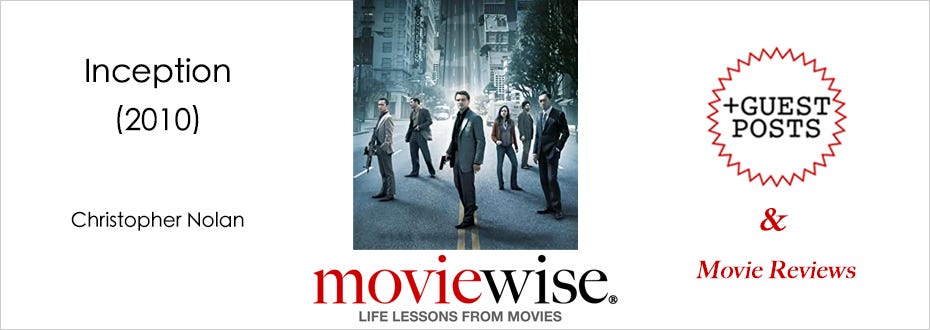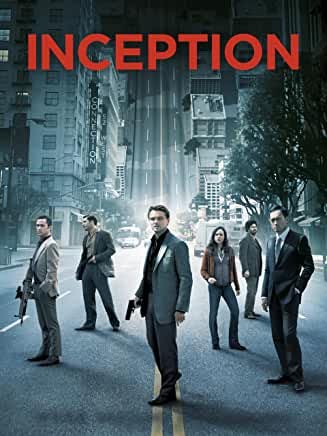"Inception" (2010)—Dreams and Deception
+Guest Posts: Movie Wisdom By Guest Writer CuriousBusiness—Issue #11
Image by L.E. Wilson from RedBubble
The Movie:
Inception (2010) is a drama written and directed by Christopher Nolan about a six-person team hired to convince the heir of a large company, Robert Michael Fischer (Cillian Murphy), to break it up by infiltrating his dreams.
Life Lesson: Be careful; you can’t always know from where your ideas come.
🍿Movie Scene Link (movie quote)
Guest Writer:
CuriousBusiness writes about business strategies, economics and finance.
How do you convince someone of an idea?
To convince someone of an idea is a human endeavor often practiced, yet little noticed. We all do it, multiple times a day, in a variety of contexts: commercial, social, romantic. We try to sell someone a product, we try to convince our friends to go to a bar, we try to convince a girl/boy to go on a date. The art of persuasion in these contexts may differ — you can construct an argument based on logic, you can rely on numbers and statistics, you can appeal to emotion, etc. — but ultimately, the goal is always the same.
The movie Inception (2010) shows us a better way to accomplish this.
The goal of the six-person crew in Inception, lead by Leonardo DiCaprio as “Cobb,” is to convince “Robert Fischer” (Cillian Murphy) to break up the company he will soon inherit from his dying father. They do so at the behest of “Saito,” (Ken Watanabe) head of a rival company, who promises Cobb the ability to see his kids again. To convince Fischer to break up the company, they don’t try to argue with him, or appeal to his emotions, but rather create an elaborate plan, in which the soon to be CEO discovers this idea in his dreams, and upon waking up believes it to be his own. Fischer had always believed his father to be disappointed with him, because he could never be the man his father was. But in the dream, the team instills the idea in Fischer that his father was disappointed not because Fischer was failing to be him, but rather because he was trying to be him. In the finale of several stages of dreams, Fischer has an epiphany that his father would want him to be his own person and build something himself, instead of taking over his father’s existing business.
And this is the essential lesson of Inception:
The best way to convince others of your idea is to convince them that it is theirs.
Cobb and his team don’t tell Fischer to build something himself, thereby accomplishing their goal of breaking up of the Fischer Empire. They guide him to a point where he himself realizes this idea and carries it forward believing it as his own.
Fortunately for us, there is no need for advanced technology to infiltrate the dreams of others to use this strategy. It is already used by major corporations, in what is known as “lifestyle advertising.” Instead of advertising a certain product’s features, they advertise a desirable lifestyle. They create a hypothetical persona, who customers can identify with and aspire to be. The subliminal message to those customers is: “Buy this product to be who you want to be.” If the message is successful, the customers will convince themselves of their need of the product.
The lesson that Inception teaches us—and which brands have long exploited for better advertisement performances is:
Instead of selling others on an idea, create an environment in which they sell themselves on it.
moviewise Review:
There seems to be a trend in contemporary movies of scrambling three different films into one. Rather than seeming edgy or creative, this technique feels more as if the filmmakers lack the discipline or the confidence in their story to follow through on a core idea and explore it fully to the bitter end. It’s a shame because there are movies like Dead Poets Society or the House of Sand and Fog that delve deep, and because of that, take us on unexpected journeys that force us to reckon with ideas and feelings that we haven’t known before. That is edgy and creative filmmaking—Inception (2010) is not.
In fact, it doesn’t take long before Inception starts to feel like a cheap, slow-moving, confused version of The Matrix (1999). It similarly has a group of expert misfits losing consciousness in a dingy room to go battle bots that are trying to kill them in another plane of existence while the audience all along searches for the truth: there is no spoon! Inception even copies some of the fun special effects that were innovative and amazing in The Matrix, like running up walls while fighting a nameless antagonist and seeming to suspend time. But Inception is not as interesting or as thought-provoking as The Matrix is.
Inception does have a riveting original concept, but it is needlessly sandwiched between a pointless 007 James Bond movie—one that consists of only the slick gun fights in faraway places—and a weaker, less suspenseful Matrix. The notion at the core of this movie is the significance of dreams in our lives—literal dreams—how they make us feel and behave, how they can be confused with memories, and how they can give us ideas that we might act on, thereby putting us at the mercy of our subconscious. But aren’t we always at the mercy of our subconscious? This is something writer/director Christopher Nolan could have explored further, instead of spending a massive budget on meaningless special effects, gun fights, and explosions.
Although Inception’s budget was three times larger than The Matrix’s, nothing in the overwrought special effects seems necessary or integral to the movie in the way the visuals do in The Matrix. The environment feels detached from the story, and really seems to simply serve as eye candy that Nolan included because he didn’t trust that the audience could enjoy a good story, a psychological thriller about a man (Leonardo DiCaprio) who betrays the trust of his wife, is riddled with guilt, and tries to make amends by… conceptually killing her off??? Or something like that. Inception is a confusing mess, with no real stakes or suspense, no clear satisfying explanation of who is doing what and why, and with too much of the action being verbalized instead of visualized, thus breaking the most cardinal of screenwriting rules: “show, don’t tell.”
But in order to guide the audience through multiple layers of disorientation, Inception needs these boring lines of exposition. And the job of inducing pages of clunky explanation falls on a stone-faced student, Ariadne (Ellen Page), who was recruited to help the team in their quest. This particular character epitomizes everything that is wrong with the movie, which is, in sum, that it’s nonsensical. She is a novice, yet somehow becomes the manager, counselor, and main problem-solver while still learning how this new world operates by asking questions like, “what is this place?” and “what’s happening?” We are not given any reason why she would risk her mental health or her life to join this team other than she likes being in a made-up world. And we mostly get these reams of exposition while she is in conversation with another character, Arthur (Joseph Gordon-Levitt), with a similar flat affect and lack of charisma or personality. Let’s just say, he’s no Neo (Keanu Reeves), and this movie is no fun.
Please go watch The Matrix instead.
Want to publish your very own Guest Post on moviewise: Life Lessons From Movies and share with the world your most impactful, most wonderful, and most profound movies? Reply to this or leave a comment below to get started 🤗.
Visit the moviewise catalogue—a searchable database of one sentence movie summaries, movie quotes, and movie wisdom—for movie recommendations.
Also visit the moviewise store. Get a t-shirt, bag, or pillow with your favorite #LifeLesson from a movie. Reply to this or leave a comment below to make a request.











Hey, big thank you to MovieWise for letting me write this guestpost. As one can maybe tell from the article, our views on Inception differ quite a bit.
I agree with many of the points made, the movie featured a lot of action sequences not central to the story, the character of Ariadne felt merely like an exposition tool and her being in charge of managing the actual Inception felt indeed very unnatural.
I think the original sin of the movie was its budget. This budget is the cause of many points of criticism mentioned - the star power/ the over the top action sequences/ the meaningless eye candy locations. These attributes are not there simply because the movie had a big budget, but rather because the movie needed even bigger sales to justify the budget and be a financial success. To achieve this number of sales, it needed many viewers. And the best way to ensure many viewers is to make a movie appealing to the masses, so to speak, which is most often easier with an action flick. Flashy trailers and adrenaline filled shots do convince a lot of people to watch a movie - and to recommend it to their friends. Perhaps keeping the story confusing, to motivate a second viewing, was also part of a sales maximising strategy - though that is pure speculation.
But that is the point that also redeems the movie for me. By wrapping the ideas of dreams and the subconsciousness in a exhilarating and fast paced story, the movie becomes much more accessible. Rather than appeal purely based of its concepts to a small group of people, it draws in a large variety of viewers, who otherwise would have never seen it. Those viewers then too get exposed to the ideas put forth and the questions raised by the movie. At first they might be superficial, like what is going on, did the totem fall, did Cobb meet his kids? But soon afterwards they turn deeper, the viewer is induced to question themes like dreams, (sub)consciousness and reality. The success of Inception is that the movie accomplishes this introspection in many different viewers, rather than in those naturally inclined to do so.
The first time I consciously came across Inception was as a poster in my then teenage cousins bedroom, and I seriously question if that would have been there, was it not at the surface an action movie. And that, for me, is the greatness of the movie.
The Nolan brothers smoke an awful lot of weed. Tenet is a case in point, a point already made by Inception, a nonsensical pile o' style that doesn't hold up on the second viewing. Yes, Leo and Tom are handsome, and yes the synth-enhanced visual effects were stunning on the big screen, but there's no story here, no characters, no tension at all. All the gunplay and car stunts layer into a numbing chaos that forces me to tune out, and once I do there's nothing there.
I felt the same way about The Matrix. It was part of a spate of movies that posited all humanity was merely a simulation (The Truman Show was another) and that we were cogs in the machine. The whole "Chosen One" trope is weak storytelling, even in a masterpiece such as Dune, and in the Matrix it's positively dreadful. "I know kung fu" is the low point of some fairly odious dialog, and there's a ton of that.
No, the movie to watch is Alex Proyas's Dark City, which came out a year before The Matrix but died at the box office. Same general premise, and also with stunning special effects, but at its center are real characters struggling to find out what the hell is going on. It's creepy, it's weird, and it says interesting things about memory and free will. I consider it as far superior to either movie discussed in this post.
Watch it yourself and see if you agree. Personally, I think it's a 90s masterpiece.